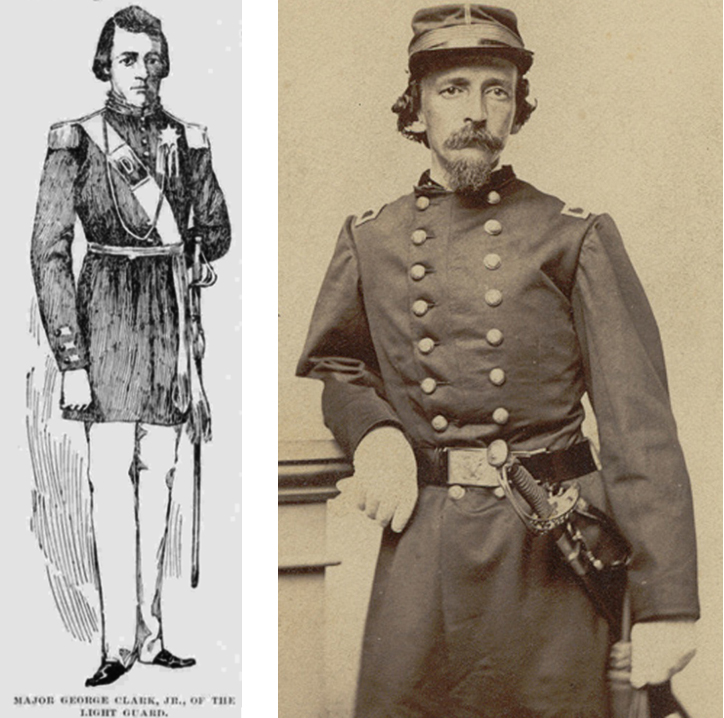
George Clark, Jr.
One hundred sixty years ago this month, George Clark, Jr., a resident of Dorchester, answered the call of duty.
Illustration: on left: George Clark, Jr., in uniform of Boston Light Guards; on right: George Clark, Jr., in Civil War uniform
In early 1861, President Lincoln issued a call for 75,000 men for the defense of the Union. The quota for Massachusetts at this first call would have been about 2,000 men, but many of the Boarder states refused to honor the draft, and Massachusetts, among others, helped to make up the deficiency, sending 3,750 men as her share within six days of the call. Major George Clark, Jr., of the 2d Brigade of Massachusetts Volunteers, in the absence of his General was called to the State house on April 15, 1861, by Governor Andrew and asked how long (or how short) a time would be required to collect his brigade. Major Clark agreed to have every man in front of the State house the next forenoon. This was done and is one of the feats of which Colonel Clark is most proud; for there were three counties to cover. All the afternoon and night he made his way by rail, carriage, horseback or on foot (that inestimably valuable adjunct, the telephone, was of course not dreamed of) personally notifying members and sending couriers in every direction. All the men were present at the time and place agreed and it was all done in eighteen hours or less.
Clark’s duties, immediately prior to this event, was the inspection of 2,000 equipments ordered by Governor in anticipation of war. He must have had a natural affinity for organization, and he had earlier gained experience in the volunteer Boston Light Guard. This company was among the most famous of those in the 1840s and 1850s. It was exclusively for young men, and the circular issued for the purpose of the formation of this company, after stating the urgent importance of its organization in the prevailing contingencies of public affairs, the unsettled relations of the country with Great Britain, and the belligerent attitude sustained by the United States toward Mexico, set forth also as an equally important part of the object to be attained, the cultivation in classes of musical elocutionary and literary talents of the members. Although, in retrospect, the members seem to have been as impressed with their appearance (uniform of white doeskin, manufactured expressly for the corps, and elegantly embroidered in gold-colored silk, the headgear consisted of a black bearskin cap with gold tassel in front and a white plume on the left side. In addition to the usual equipments, the rank and file wore an improved pattern of the French short sword or “banger”) as their goals. However, it was noted that they soon achieved a high state of proficiency in military exercise.
When the first captain of the Guard was drowned while returning from Galveston to New Orleans, Lieutenant George Clark, Jr., became the new captain of the company and commanded it during the greater part of its existence. The guards won the reputation of being the best drilled company in New England and received many compliments from high officials at that time.
Clark, as we have seen, was instrumental in bringing men together to join the Civil War. Clark served as Colonel and commander of the 11th Regiment Massachusetts Volunteer Infantry from its muster in on Jun. 13, 1861 until he was discharged due to disability on Oct. 11, 1861. He must have been quite familiar with the members of Company K of his regiment, since most of them were also from Dorchester. In Good Old Dorchester, William Dana Orcutt stated “with a population of ten thousand, she [Dorchester] enrolled thirteen hundred and forty-two soldiers, which was one hundred and twenty-three in excess of all calls.”
Sources:
Obituary
The Boston Globe, May 7, 1895.
William Dana Orcutt. Good Old Dorchester. (Cambridge, 1893), 418.
See also George Clark Jr. The Boston Globe, October 9, 1895.
https://www.newspapers.com/image/430701266/?terms=george%20clark%20jr&match=1
The Dorchester Beacon, July 30, 1892.
“The Boston Light Guard”
The Dorchester Beacon, January 14, 1893.
